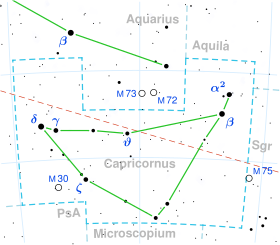
| |
| Observation data Epoch J2000.0 Equinox J2000.0 (ICRS) | |
|---|---|
| Constellation | Capricornus |
| Right ascension | 20 40 02.94518 |
| Declination | −18° 08′ 19.1664″ |
| Apparent magnitude (V) | 5.17 |
| Characteristics | |
| Spectral type | M1 III |
| B−V color index | +1.65 |
| Astrometry | |
| Radial velocity (Rv) | −12.3±1.6 km/s |
| Proper motion (μ) | RA: −23.503 mas/yr Dec.: −22.157 mas/yr |
| Parallax (π) | 4.4702 ± 0.2352 mas |
| Distance | 730 ± 40 ly (220 ± 10 pc) |
| Absolute magnitude (MV) | −1.09 |
| Details | |
| Radius | 76.36+8.05 −14.16 R☉ |
| Luminosity | 1,283.0±76.5 L☉ |
| Temperature | 3,953+427 −193 K |
| Metallicity | −0.08 dex |
| Other designations | |
| υ Cap, 15 Capricorni, NSV 25208, BD−18°5738, FK5 773, HD 196777, HIP 101984, HR 7900, SAO 163779 | |
| Database references | |
| SIMBAD | data |
Upsilon Capricorni, Latinized from υ Capricorni, is a solitary star in the southern constellation of Capricornus. It has a reddish hue and is dimly visible to the naked eye with an apparent visual magnitude of 5.17. The star is about 730 light years from the Sun based on parallax, but is drifting closer with a radial velocity of −12 km/s. It is 0.22 degree north of the ecliptic, so is subject to lunar occultations.
This is an aging red giant star on the asymptotic giant branch with a stellar classification of M1 III, a star that has exhausted the supply of hydrogen at its core then cooled and expanded. At present it has 76 times the radius of the Sun. It is a suspected variable star of unknown type with a brightness that has been measured ranging from a peak of 5.19 down to 5.24. The star is radiating 1,283 times the luminosity of the Sun from its swollen photosphere at an effective temperature of 3,953 K.
References
- ^ Brown, A. G. A.; et al. (Gaia collaboration) (August 2018). "Gaia Data Release 2: Summary of the contents and survey properties". Astronomy & Astrophysics. 616. A1. arXiv:1804.09365. Bibcode:2018A&A...616A...1G. doi:10.1051/0004-6361/201833051. Gaia DR2 record for this source at VizieR.
- ^ Barnes, T. G.; et al. (May 1978), "Stellar angular diameters and visual surface brightness. III - an improved definition of the relationship", Monthly Notices of the Royal Astronomical Society, 183 (3): 285–304, Bibcode:1978MNRAS.183..285B, doi:10.1093/mnras/183.3.285.
- ^ Houk, N.; Smith-Moore, M. (1988), Michigan Catalogue of Two-dimensional Spectral Types for the HD Stars, vol. 4, Bibcode:1988mcts.book.....H.
- ^ Gontcharov, G. A. (November 2006), "Pulkovo Compilation of Radial Velocities for 35495 Hipparcos stars in a common system", Astronomy Letters, 32 (11): 759–771, arXiv:1606.08053, Bibcode:2006AstL...32..759G, doi:10.1134/S1063773706110065, S2CID 119231169.
- ^ Anderson, E.; Francis, Ch. (2012), "XHIP: An extended hipparcos compilation", Astronomy Letters, 38 (5): 331, arXiv:1108.4971, Bibcode:2012AstL...38..331A, doi:10.1134/S1063773712050015, S2CID 119257644.
- "* ups Cap". SIMBAD. Centre de données astronomiques de Strasbourg. Retrieved 2017-05-12.
- Eggleton, P. P.; Tokovinin, A. A. (September 2008), "A catalogue of multiplicity among bright stellar systems", Monthly Notices of the Royal Astronomical Society, 389 (2): 869–879, arXiv:0806.2878, Bibcode:2008MNRAS.389..869E, doi:10.1111/j.1365-2966.2008.13596.x, S2CID 14878976.
- White, Nathaniel M.; Feierman, Barry H. (September 1987), "A Catalog of Stellar Angular Diameters Measured by Lunar Occultation", Astronomical Journal, 94: 751, Bibcode:1987AJ.....94..751W, doi:10.1086/114513.
- Dunham, D. W.; Evans, D. S.; Silverberg, E. C.; Wiant, J. R. (March 1973), "The angular diameter of Upsilon Capricorni and an occultation of SAO 118655.", Astronomical Journal, 78: 199–201, Bibcode:1973AJ.....78..199D, doi:10.1086/111398.
- Eggen, Olin J. (July 1992), "Asymptotic giant branch stars near the sun", Astronomical Journal, 104 (1): 275–313, Bibcode:1992AJ....104..275E, doi:10.1086/116239.
- Samus, N. N.; et al. (2017), "General Catalogue of Variable Stars", Astronomy Reports, 5.1, 61 (1): 80–88, Bibcode:2017ARep...61...80S, doi:10.1134/S1063772917010085, S2CID 125853869.
| Constellation of Capricornus | |||||||||||||
|---|---|---|---|---|---|---|---|---|---|---|---|---|---|
| Stars |
| ||||||||||||
| |||||||||||||
| |||||||||||||
| Galaxies |
| ||||||||||||
| |||||||||||||